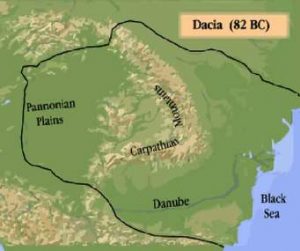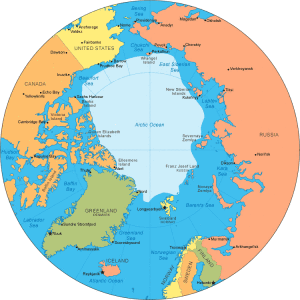nationalism
Romania
Romania does not automatically leap to mind as a possible location for Atlantis, nevertheless, in 1913 a massive book by Nicolae Densusianu was published in which such a claim was made. The suggestion was made en passant in this large work, which is mainly concerned with the prehistoric evolution of civilisation in the Dacia region of Romania. The 1000-page+ book in English is available in its entirety on the Internet[1597].
The Pannonian Plain, now part of Hungary was formerly part of ancient Dacia. A paper was submitted to  the 2008 Atlantis Conference in Athens by three Romanian researchers, M. Ticleanu, P. Constanin and R. Nicolescu proposing that this region had been the original location of Atlantis. This paper, together with a large number of maps, is now available on the internet(a).
the 2008 Atlantis Conference in Athens by three Romanian researchers, M. Ticleanu, P. Constanin and R. Nicolescu proposing that this region had been the original location of Atlantis. This paper, together with a large number of maps, is now available on the internet(a).
The location of the Pillars of Heracles is also discussed in depth and the author not unexpectedly also locates them along the Danube (Pt3 – Ch.XVI). It is noteworthy that in ancient times the Danube was called Okeanos Potamos.
To what extent nationalistic motives were the moving force behind this noteworthy tome is difficult to ascertain, but the possibility should be borne in mind. However, his excessive nationalism, was popular during the communist regime, but is now deemed unacceptable and his work discredited.
Nevertheless, interest in Densusianu and aspects of his theories have seen a resurgence in books from researchers such as Adrian Bucurescu and Alexandra Furdui.
>A cache of Roman coins was discovered in Transylvania in 1713. Originally accepted as genuine they were later, in 1868, denounced as forgeries. Now they are again being considered genuine. The debate centres on the image on the coins of Emperor Sponsian of whom no other record is known. It has been remarked that “at that time the bar for being an emperor was very old(b).<
In the meantime, neighbouring Bulgaria had seen the unearthing of remarkable artefacts, including gold jewellery, dating to 3000 BC and is now claiming the discovery of rock temples in the Rhodope Mountains that are a thousand years older than the Mesopotamian and Egyptian civilisations. Watch this space.
Britain * .
Britain. For as long as I can remember, received wisdom told us that the ancestors of the British (and Irish) had Celtic origins. Then in 2007, Dr Stephen Oppenheimer, professor of genetics at Oxford University ‘threw a cat among the pigeons’ when he bluntly wrote “Everything you know about British and Irish ancestry is wrong. Our ancestors were Basques, not Celts” in Origins of the British [1950].R.Cedric Leonard reviews Oppenheimer’s claims in the book and two earlier papers(d)(e)(f).
Britain as the home of Atlantis has been claimed by many writers and not without undertones of nationalism by some of the British authors. Nevertheless, support for the idea has been offered by a number of more disinterested researchers. Probably the first to advance this idea was John Wallis (1660-1703), who, in 1700, proposed that the Atlantis story had been corrupted over time and was a reference to the destruction of the landbridge that had existed between France and England, leaving a British Atlantis more isolated (The original Brexit!)(c). It was nearly a century before the idea was taken up by Thomas Pennant and then more than another century passed before Cooper, Spence, Beaumont and Calestani produced related theories. Fast forward to the 21st century, when Donald Ingram identifies the Wessex II culture as Atlantean and Melville Nicholls considers Britain to be one of the Atlantean islands referred to by Plato.
The precise location, the exact date and the probable cause of the destruction of Atlantis are the basis for a range of theories. There is general acceptance that following the deglaciation at the end of the last Ice Age vast regions of low-lying land that had linked Ireland and Britain to mainland Europe were gradually flooded.
One school of thought is that these flooded regions contained Atlantis, of which the most extensive was in the North Sea and is now known as Doggerland. Other offshore locations proposed for Atlantis are the Celtic Shelf (Gidon, Steuerwald & Koudroiavtsev) and the Irish Sea (Dunbavin). These lands had been settled and following the inundations, its inhabitants were forced to retreat to the higher ground of what is modern Europe and the British Isles.
David L. Hildebrandt in Atlantis-The Reawakening [1602] proposes a reworking of the ‘Atlantis in Britain’ theory with some new perspectives. For me, his date, location and identity of the Atlanteans do not ring true, particularly why Stone Age people in Southern Britain would want to launch an attack on Athens, over 2,000 miles away, a city-state that did not even exist at the time. Those early Britons did not have the wheel, yet Plato tells us that the Atlanteans had chariots!
Another view is that Atlantis was destroyed by the impact of a comet or asteroid, an idea espoused by Dunbavin and Spence.
E. J. de Meester on his now-defunct website postulated a link between Stonehenge and Atlantis(b). After arbitrarily dividing Plato’s dimensions by ten, he suggested that the plain described by Plato lay in a rectangle between Salisbury and Chichester.
A recent suggestion by a Dutch commentator, Leon Elshout, places the biblical Tarshish in Britain(h) an idea also supported by a Christadelphian website(g).
(a) https://sabidius.blogspot.com/2010/06/atlantis-was-it-britain.html
(b) https://web.archive.org/web/20090614050055/https://home-3.tiscali.nl/~meester7/engatlantis.html
(c) https://royalsocietypublishing.org/doi/10.1098/rstl.1700.010
(d) http://www.prospectmagazine.co.uk/magazine/mythsofbritishancestry/
(e) http://www.prospectmagazine.co.uk/magazine/mythsofbritishancestryrevisited/
(f) https://web.archive.org/web/20170113172907/http://www.atlantisquest.com/Bretons.html
(g) Incredible Archaeological Find Proves Tarshish Is Britain! (archive.org) *
(h) https://roodgoudvanparvaim.nl/8-tarshish-as-great-britain-and-the-paradox-with-atlantis/
Arctic Region
The Arctic Region offers evidence of human activity as long as 45,000 years ago, 10,000 years earlier than previously thought, according to a report(f) in 2016.
Of interest to us is that Spitzbergen was proposed as the location of Atlantis by the French astronomer Jean Silvain Bailly in the 18th century. In 1885, Dr.  W. F. Warren,a former president of Boston University published a book[078]that proposed that the cradle of the human race was situated at the North Pole and had been inundated at the time of the Deluge. Warren’s book can now be accessed online(d), while a brief, but caustic, review of his theory was undertaken by Jason Colavito a few years ago(i).
W. F. Warren,a former president of Boston University published a book[078]that proposed that the cradle of the human race was situated at the North Pole and had been inundated at the time of the Deluge. Warren’s book can now be accessed online(d), while a brief, but caustic, review of his theory was undertaken by Jason Colavito a few years ago(i).
Bal Gangadar Tilak, an Indian independence campaigner, was so impressed by Warren’s ideas that in his book, Arctic Home in the Vedas [1296], he chose to locate the lost Paradise of Airyana Vaejo in the Arctic(e). The British philosopher, J.G. Bennett was sympathetic to Tilak’s ideas and proposed their further investigation, while being more dismissive of Warren’s reasoning(j).
More recently Gene Matlock also claimed that the Garden of Eden had been situated at the North Pole(h).
Modern Russian nationalism seems to have adopted some of the dafter notions of Nazi Germany including the idea of an Aryan master race, from which they claim to be descended, that was formerly located in the Arctic. It was revealed in 2016 that a former Nazi base had been discovered in the Arctic, which had been used to search for ancient artefacts(g).
Such ideas are expounded by the new darling of Russian neo-fascism, Alexander Dugin, who likes to blend nationalism with mysticism. It is rather worrying that some elements of this nationalism have also adopted anti-semitism as part of their rhetoric(b).
More recently Professor Sergey Teleguin has again drawn attention to Tilak’s work in an article that identifies elements in the Mayan Popul Vuh, which suggest that its origins were in the far north, in Ultima Thule. He concludes with the thought that perhaps the Indo-European and Mayan ancestors came from the true North Pole! Teleguin has outlined his ideas further in an article for (Nov/Dec 2013) Issue 102 of Atlantis Rising magazine.
>In 1906, the American explorer, Robert Peary, made a failed attempt to be the first to reach the North Pole. On his return, he claimed that he had seen a previously unknown, massive landmass complete with soaring mountains and deep valleys, which he called Crocker Land after one of his sponsors. His story received a mixed reception, but another well-known explorer, Donald Baxter MacMillan, took Peary’s account at face value and organised an expedition to find Crocker Land, that set out in July 1913. Where Peary’s attempt was a failure, MacMillan’s was a disaster that ended in murder. Needless to say, Crocker Land was not found, as it does not exist in the Arctic any more than Atlantis does. The story is a fascinating read(k).<
(b) Archive 2415)
(d) https://www.sacred-texts.com/earth/pf/index.htm
(e) https://archive.org/details/in.gov.ignca.9566/page/n7/mode/2up
(f) https://www.sciencemag.org/news/2016/01/grisly-find-suggests-humans-inhabited-arctic-45000-years-ago
(h) http://www.viewzone.com/edenpole.html
(i) http://www.jasoncolavito.com/blog/was-the-garden-of-eden-at-the-north-pole
(k) The Quest for the Mysterious Lost Atlantis of the Far North | Mysterious Universe *
Nationalism
Nationalism was clearly the motivation behind some of the Atlantis theories that have been proposed over recent centuries. Olaf Rudbeck audaciously promoted his native Sweden in the 17th century, just as the eccentric William Comyns Beaumont claimed that Britain was Atlantis in the early 20th century and some Albanians, Azoreans, Maltese and Sardinians make comparable claims today. However, the most sinister manifestation of Atlantis based nationalism was the attempt to hijack it as the original homeland of the Aryan predecessors of the Nazis, probably borrowing the idea from Blavatsky. This was partly to replace the Abrahamic cultural lineage claimed by so many western nations. Today elements of modern Russian nationalism also look to an Aryan ancestry based in the Arctic.
*The linking of nationalism with (pseudo)archaeology is exemplified by the Bosnian pyramid claims of Samir Osmanagich and the manner in which the local media and politicians have used them to boost national pride, in spite of the contrary views expressed by qualified geologists and archaeologists(b).*
Vanessa Ward gives a good overview of the Atlantis based nationalism of both Rudbeck and the Nazis(a).
(a) https://pseudoarchaeology.org/a10-ward.html
*(b) https://www.smithsonianmag.com/history/the-mystery-of-bosnias-ancient-pyramids-148990462/*
